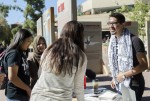Students put up a wall in Bruin Plaza this week to symbolize the occupation of Palestinian territories by the Israeli military as part of the annual Palestine Awareness Week.
Students for Justice in Palestine, a student organization that aims to support the Palestinian struggle, organized the events, which started Monday and run through Thursday.
The weekfeatures a mock “apartheid wall” to symbolize the controversial separation barrier that borders the West Bank, as well as speakers and an art exhibition, said Dana Saifan, president of Students for Justice in Palestine and a fourth-year psychology student.
The week is usually hosted during winter quarter, but was organized earlier this year. Students for Justice in Palestine put on the event to educate students about the Israeli-Palestinian conflict and Palestinian culture, Saifan said.
A poetry and open mic night, an exhibition on Palestinian refugees and a cultural celebration are included in the week of events. The mock “apartheid wall,” a staple of Palestinian Awareness Week, will be up in Bruin Plaza until Thursday, said Agatha Palma, a board member for Students for Justice in Palestine and a graduate student in anthropology at UCLA.
The week of events is not only meant to draw attention to the struggles of Palestinians, but also to celebrate Palestinian culture as well, said Palma.
For many supporters of Palestinian self-determination, central issues to the Israeli-Palestinian conflict include the end of Israeli occupation of the West Bank, the right of return to Israel for Palestinian refugees of the 1948 Arab-Israeli War and the end of a blockade of the Gaza Strip.
Students walked past the “apartheid wall” Monday and Tuesday, some stopping to discuss or argue about the Israeli-Palestinian conflict with students who organized the event.
Palma said Students for Justice in Palestine reached out to students from other campus organizations, as well as students new to the issue, in order to include them in Palestine Awareness Week.
“We have had a lot of volunteer work from people that aren’t members of Students for Justice in Palestine,” said Rasha Howlader, a fourth-year electrical engineering student and financial director of Students for Justice in Palestine. “It is nice to feel connected with people from different cultures.”
The organization partnered with some other groups on campus, such as MEChA de UCLA, said Omar Zahzah, programming director for Students for Justice in Palestine and a graduate student in comparative literature at UCLA.
“This year, we are working more with other student groups,” Saifan said. “We have a lot of momentum.”
Saifan, a Palestinian-American, said she has relatives that are affected by the conflict every day.
“My family was forced out of Palestine … my whole family has been affected,” Saifan said. “They have limited power living under occupation.”
Ayesha Khan, a third-year microbiology, immunology and molecular genetics student who was looking at the wall in Bruin Plaza Tuesday afternoon, said she is not affiliated with either side of the conflict and thinks dialogue is necessary for student organizations to come to an understanding on many issues.
Some members of Bruins for Israel, an organization that works to educate the campus community on Israeli politics and culture, said they disagree with certain aspects of Palestine Awareness Week.
“We want to acknowledge the past, but not live in it,” said Miriam Eshaghian, a fourth-year psychobiology student and president of Bruins for Israel. Eshaghian said some facts presented during Palestine Awareness Week were incorrect or lacked context.
Tammy Rubin, a third-year human biology and society student and director of public affairs for Bruins for Israel, said she thinks it is necessary for students involved with Palestine Awareness Week to voice their opinions.
Members of Bruins for Israel will not be present at the headline events, but they will be spread out across campus distributing pamphlets and providing students with a perspective on the Israeli-Palestinian conflict from the Israeli point of view, Rubin said.
Some students said tension surrounding campus conversation on the conflict has run especially high since the Undergraduate Students Association Council discussed a resolution concerning the Israeli-Palestinian conflict two weeks ago.
More than 100 students showed up to the USAC meeting to voice their concerns about the resolution, which some said would cause division among students on campus.
Organizers of this week’s events stressed that they aim to educate and foster understanding, not to polarize UCLA students.
“(The wall) isn’t to recruit new members,” Zahzah said. “We’re hoping for people to see the facts.”

“Organizers of this week’s events stressed that they aim to educate and foster understanding, not to polarize UCLA students.”
This should be a quote to remember. Through what I saw on social media and public debate, the organizers of the wall certainly did not abide to their self-described goal.